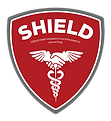
The
SHIELD Training Initiative
SHIELD is designed to protect those whose job is to address spiraling addiction and overdose challenges in their communities. Using the latest research, we deploy tools that boost the occupational health and effectiveness of first responders, criminal justice, and behavioral health personnel tasked with overdose crisis response.
The SHIELD initiative focuses on improving community responses to the addiction and overdose crisis. Our mission is to safeguard the occupational health and effectiveness of frontline personnel. Whether police, legal, emergency medical, or other professionals, they are often asked to take on new roles and responsibilities in response to overdose and other emerging challenges, but without adequate tools or training. These demands compound their stress and burnout, reducing effectiveness and retention.
SHIELD fills this gap. Built on decades of experience and research, our initiative improves the interface with local community organizations that specialize in evidence-based drug treatment and other supportive services.
Our two-decade track record has taught us that no two jurisdictions are the same. This is why listening to specific agency needs is the driving engine of our work. Working with the right mix of in-person, web-based and mobile delivery channels, we supply frontline personnel with the most relevant and actionable tools to improve their health, safety, and effectiveness.
Recent Publications, News, and Events
Safeguarding Occupational and Public Health During the Overdose Crisis – SHIELD Training Model
SHIELD Training Initiative, Translational Science Benefits Model, August 18, 2025
Safeguarding Officers Amidst the Addiction Crisis
Mark Elliott, Leo Beletsky et al., Police Chief Online, July 16, 2025
The Elephant in the Room Can No Longer be Ignored: Police Suicide
Bob Long D/LT. (Ret.) Mass State Police,The Somerville/Medford News Weekly, June 20, 2025
What People Are Saying About SHIELD Training Courses
.png)